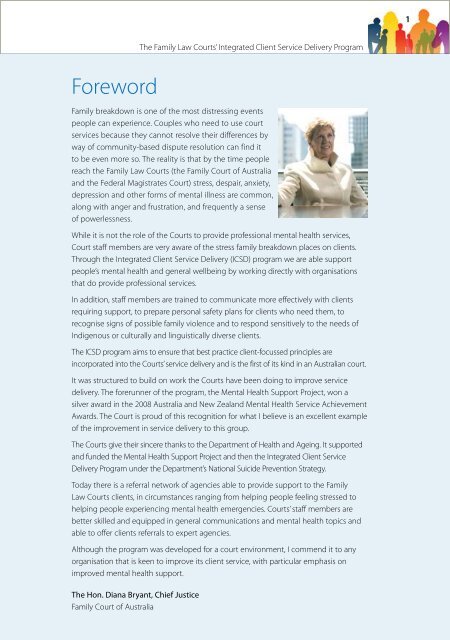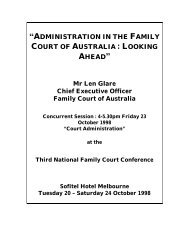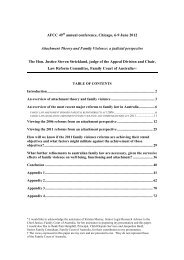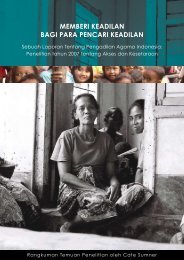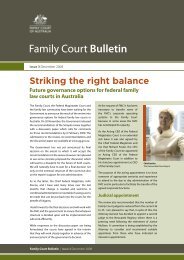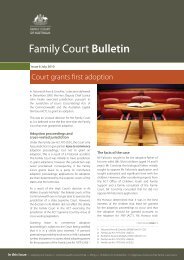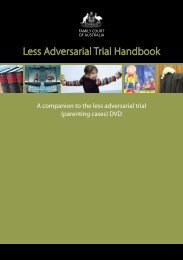Integrated client service delivery, featuring mental health support ...
Integrated client service delivery, featuring mental health support ...
Integrated client service delivery, featuring mental health support ...
Create successful ePaper yourself
Turn your PDF publications into a flip-book with our unique Google optimized e-Paper software.
1The Family Law Courts’ <strong>Integrated</strong> Client Service Delivery ProgramForewordFamily breakdown is one of the most distressing eventspeople can experience. Couples who need to use court<strong>service</strong>s because they cannot resolve their differences byway of community-based dispute resolution can find itto be even more so. The reality is that by the time peoplereach the Family Law Courts (the Family Court of Australiaand the Federal Magistrates Court) stress, despair, anxiety,depression and other forms of <strong>mental</strong> illness are common,along with anger and frustration, and frequently a senseof powerlessness.While it is not the role of the Courts to provide professional <strong>mental</strong> <strong>health</strong> <strong>service</strong>s,Court staff members are very aware of the stress family breakdown places on <strong>client</strong>s.Through the <strong>Integrated</strong> Client Service Delivery (ICSD) program we are able <strong>support</strong>people’s <strong>mental</strong> <strong>health</strong> and general wellbeing by working directly with organisationsthat do provide professional <strong>service</strong>s.In addition, staff members are trained to communicate more effectively with <strong>client</strong>srequiring <strong>support</strong>, to prepare personal safety plans for <strong>client</strong>s who need them, torecognise signs of possible family violence and to respond sensitively to the needs ofIndigenous or culturally and linguistically diverse <strong>client</strong>s.The ICSD program aims to ensure that best practice <strong>client</strong>-focussed principles areincorporated into the Courts’ <strong>service</strong> <strong>delivery</strong> and is the first of its kind in an Australian court.It was structured to build on work the Courts have been doing to improve <strong>service</strong><strong>delivery</strong>. The forerunner of the program, the Mental Health Support Project, won asilver award in the 2008 Australia and New Zealand Mental Health Service AchievementAwards. The Court is proud of this recognition for what I believe is an excellent exampleof the improvement in <strong>service</strong> <strong>delivery</strong> to this group.The Courts give their sincere thanks to the Department of Health and Ageing. It <strong>support</strong>edand funded the Mental Health Support Project and then the <strong>Integrated</strong> Client ServiceDelivery Program under the Department’s National Suicide Prevention Strategy.Today there is a referral network of agencies able to provide <strong>support</strong> to the FamilyLaw Courts <strong>client</strong>s, in circumstances ranging from helping people feeling stressed tohelping people experiencing <strong>mental</strong> <strong>health</strong> emergencies. Courts’ staff members arebetter skilled and equipped in general communications and <strong>mental</strong> <strong>health</strong> topics andable to offer <strong>client</strong>s referrals to expert agencies.Although the program was developed for a court environment, I commend it to anyorganisation that is keen to improve its <strong>client</strong> <strong>service</strong>, with particular emphasis onimproved <strong>mental</strong> <strong>health</strong> <strong>support</strong>.The Hon. Diana Bryant, Chief JusticeFamily Court of Australia


